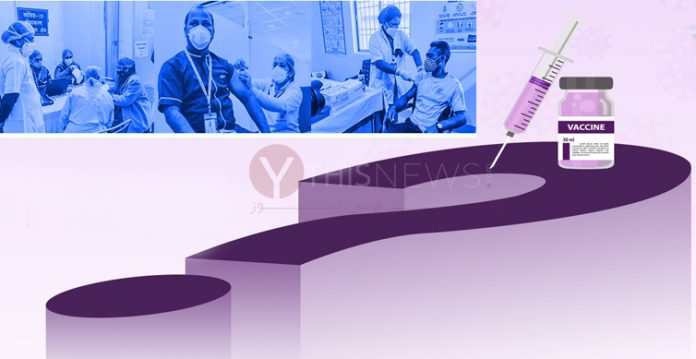The milestone of getting coronavirus eradicated seems close now as vaccines capable to fight the infection are here. However, this battle can be won only when the entire population gets inoculated, which isn’t the scene with India as unlike other countries, we have plenty of shots available but not many ready to get vaccinated.
Hosting one of the biggest vaccination drives in the world, India aims to administer the vaccine to 300 million people by July 2021. But, this doesn’t possible now as not just the public but even some healthcare and frontline workers are hesitating to get vaccinated. Monday’s reports showed that only 56% of people, out of those eligible to take the shot, were willing to get inoculated. The rest did not want to.
The reason? The uncertainties that are revolving around the efficiency and possible risks with the vaccine. Moreover, many are questioning the actions of the drugmakers and the government who are trying to get the healthcare workers administered with a vaccine that is still in its phase 3, implying that the trials are getting carried out on the very people whom the country needs the most at such crucial times.
Raising similar queries is Vinod Kumar, a resident doctor at Patna’s All India Institute of Medical Sciences. He says, “At least 40% of doctors here are unsure and want to wait. Carrying out a vaccine trial on us when India is short of doctors, health-care workers don’t make sense.”
However, a vaccine is the only way out of this deep, dark tunnel that has trapped the world. If this trend of unwillingness continues, any chances of reviving the economy back from falling into the pits of the biggest annual contraction, last witnessed in 1952, will vanish.
People are also raising eyebrows over the same issue in Brazil, Japan, and China as well, but the altitude of the problem here in India is much higher.
As countries like the US and Europe aren’t able to vaccinate their citizens due to a scarcity of vaccines, they are requesting India to furnish them with the required aid. India has already announced that it can manufacture 500 million shots every month for export, attracting multiple orders from Belgium, Saudi Arabia, and Brazil.
Currently, India has 2 vaccines available for administration in its drive- The SII’s Covishield and private firm Bharat Biotech’s Covaxin. The Hyderabad-based indigenous drugmaker witnessed itself in the midst of heavy criticism as it was slammed for the lack of data by many scientists.
Adarsh Pratap Singh, a member of the Resident Doctors Association at the All India Institute of Medical Sciences in New Delhi said, “Many in our institute aren’t comfortable with Covaxin because we don’t know how effective it is,” while adding, “To build trust among people the government must come out with the data, evidence of the trials, and encourage free and fair discussions.”
Needless to say, the government and the pharmaceutical company have got vocal, defending their produce. Earlier in January, Bharat Biotech’s chairman, Krishna Ella, said that they’ve completed “200% honest clinical trials” with a prior record of making 16 safe and effective vaccines.
Thrashing critics, on January 4th press briefing, he said, “Indian scientists want to bash on other Indian scientists.”
Rejecting rumors that claimed vaccines could result in infertility, the government has come forward to urge citizens to take the vaccine without any fears. With hashtag #CoronaWarriors, Health Minister Harsh Vardhan tweeted, requesting everyone to get vaccinated.
Meanwhile, V. K. Paul, a member of the planning body Niti Aayog, said, “Vaccine hesitancy among health workers should end — I am pleading on behalf of the government, that please adopt it because no one knows how this pandemic will take shape in the future,” while confirming that he has got himself inoculated with Covaxin and have no adverse effects.
“These two vaccines are safe,” he said. “We have a system to track it and if there is an unusual signal, it will be responded to the way it should be.”
Preeti Sudan, a former secretary at the federal ministry of health and family welfare, said fears surrounding any new vaccine is normal during the beginning of the drive, reminding that the polio immunization program too was successful only after carrying out a campaign with mothers, children, and opinion leaders.







